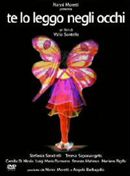
I CAN SEE IT IN YOUR EYES
Italy, 2004, 82 minutes, Colour.
Stefania Sandrelli, Teresa Saponangelo, Camilla de Nicola.
Directed by Valia Santella.
I Can See It In Your Eyes is a brief Italian drama, centred on a very dominating mother, her rather repressed daughter and her granddaughter. The film is very much a woman’s film and is directed by first-time director Valia Santella.
The film offers a portrait of a singer who dominates her family and is extraordinarily self-centred. She is played by veteran Italian actress Stefania Sandrelli who has appeared toplining Italian films since the early 60s. She is perfectly convincing in the role. By contrast Teresa Saponangelo offers a more modest screen presence. The catalyst for further interaction between mother and daughter is when the mother abducts the little girl, who also suffers from asthma and is in danger of an attack, on what she sees as a liberating trip, telling her not to worry about illness and being pampered by her mother.
When the girl has an attack, it is an opportunity for the mother to come to some kind of realisation of her impact in the family, the aftermath of an operation on her throat which could destroy her singing career, accepting her daughter.
While the performances are strong, the material is that of a television movie.
1.Contemporary Italy? Naples? The use of the city?
2.The title, the focus on Margherita, on Chiara, on Lucia?
3.The focus on characters, family relationships, love and hate? Ambitions and career? Love and neglect?
4.The focus on Margherita, going to hospital, the operation, the operation on her throat? A singer? Her not accepting it? As a personality, big and strong, domineering? Her career? Her long marriage? Her daughter, her neglect of her daughter? Love-hate relationship? Her coming out of hospital, the reaction of her relatives, the indiscreet woman commenting on the loss of the voice? Her going on television, her interviews? Her daughter and granddaughter present? Her lifestyle, the doctor, the relationship with him? Going to see him, her concern? The domestic sequences, with her granddaughter? Suddenly taking her granddaughter, the day out, not believing she would suffer from asthma? The enjoyment of the day, the visits, the boat ride, seasick? The return to the hotel, the asthma bout, her desperation? The reconciliation with her daughter? With her husband? A pampered woman? Riding roughshod over others? Getting older and having to face it? Her career, her concert, her manager? Her future?
5.The contrast with Chiara, her work as a voice therapist, seeing her at work? Her ex-husband, their relationship, care for their daughter? The daughter at home, her caring for her, perhaps smother-love? Sensing her illnesses? The hospitalisation of her mother, her presence, care? Her own life, in the shadow of her mother? Her daughter being taken, her desperation, going to her father? The long search? Finally finding her, the reconciliation?
6.The little girl, her relationship with her mother, delight in life, going with her grandmother, enjoying the day out, feeling guilty about her mother, her becoming ill?
7.The husband, quietly in the background, devotion to his wife, love for his daughter, granddaughter? Helping in the search? The frank talks with his daughter, about his wife, her affair, her age?
8.The doctor, the relationship with Margherita, the affair, her going to see him – and his not being serious about the relationship?
9.The manager, his pampering Margherita, doing the arrangements, the rehearsals, the concert, the venue?
10.The atmosphere of Naples, outings in Naples, the city as a character?
11.The significance of the title in terms of the relationships – a satisfying film about family relationships?